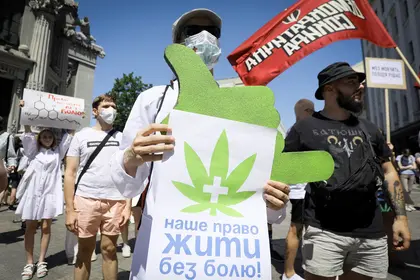Ukraine partly legalized the use of cannabis products for medical purposes on April 7.
The Cabinet of Ministers made legal the use of dronabinol and nabilone, which are synthetic cannabis-like chemicals, and nabiximols, a cannabis extract.
The use of these substances “is allowed only in the form of medical drugs or in the form of substances intended for the production and manufacture of medical drugs,” the decree says.
Cannabidiol isolate, which does not contain any tetrahydrocannabinol (THC) — the main psychoactive component of cannabis — was not made legal.
Dronabinol and nabilone are produced synthetically and imitate the effects of THC.
Dronabinol treats loss of appetite that causes weight loss in AIDS patients, as well as vomiting and nausea during chemotherapy. It is legal in the United States, Australia and Germany, among other countries.
Nabilone is also primarily used to treat nausea caused by chemotherapy and is legal in Canada, the U.S., U.K., and other countries.
Nabiximols is usually sold as mouth spray and is used to treat symptoms of multiple sclerosis, such as neuropathic pain, overactive bladder and spasticity — a condition where muscles tighten, affecting speech and movement. It is legal in 16 countries, including Canada and parts of Europe.
Last year, in the fall, the President’s Office said that around 2 million cancer patients in Ukraine are in need of medical cannabis.
Medical experts say that cannabis is a better pain reliever than other drugs like opioids, which are often toxic and addictive, have dangerous side effects, and can lead to overdose.
Many volunteers and non-governmental organizations that help cancer patients in Ukraine have long been advocating for the legalization of medical cannabis as a safer painkiller.
The possibility of legalization of medical cannabis was one of the questions posed to President Volodymyr Zelensky during his nationwide poll in October. Over sixty percent of respondents supported legalization.
You can also highlight the text and press Ctrl + Enter




